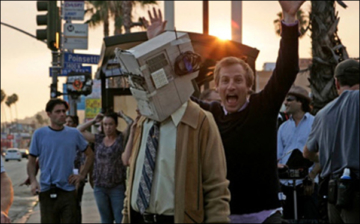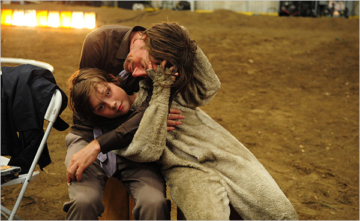Look up at an ornate ceiling, speckled blue and pink. Look down to see people crowding in, eyes bright with that glint of excitement. Look ahead and see a man dwarfed by a gigantic church organ. He begins to play. Bjork comes on screen… And Spike Jonze skips on stage…
This was the experience of being at Sydney’s Vivid Talk with filmmaker Spike Jonze last night. The whole event was rare and fun and intuitive: feelings which, it seems, the filmmaker lives and creates by. Spike Jonze, best known for directing Her (2013), Where The Wild Things Are (2009), Adaptation (2002), and Being John Malkovich (1999) has also made numerous other shorts, music videos and commercials, as well as having his hand in acting, writing, and producing. Head filled with knowledge and placed before an adoring crowd, he sat down with two of his friends, Stef Mitchell and Campbell to talk about his life and work.

When Adam Spiegel was younger he was heavily into skating and it is here that he garnered the name Spike Jonze and got his start in filmmaking. Working as an assistant on Freestylin’ magazine and later founding Dirt, he was asked to shoot and edit skating footage for a skating film Video Days, with no prior knowledge of how. Being thrown into the deep end for his first shoot is likely the reason why his work is so instinctive and playful to this day. From there, he continued to direct music videos and in 1999 dressed up as Richard Koufey, a community dance troupe leader, for Fatboy Slim’s Praise You and danced outside a movie theatre for the video (last nights audience was also lucky enough to see a short rendition in the flesh).

But studios don’t like renegades and when commissioned for his first feature, Harold And The Purple Crayon, the studio cut and moulded his work until it was unrecognizable as his. The feature was eventually cancelled after a year and a half of pre-production and the filmmaker spoke briefly about his guilt at being relieved by the cancellation. He had compromised by an inch so many times that the film had gotten away from him and his vision.
So he learnt to say no. But his tension with studios didn’t stop there. Later, when editing Where The Wild Things Are, he was faced with so much dislike from the studio because the film was “too sad”, “too scary”, too this, too that and after months of to and fro, the filmmaker was ready to walk away from the production. Only after threatening to quit did the studio back down and let him make the film he wanted to make. Despite all of this, the final product was sad and real and hopeful, carrying a childlike air throughout it which is uniquely Spike Jonze.
Amidst this discussion of art, compromise, and passion, the filmmaker could be seen holding a pair of hairdressing scissors. Why, you ask? Why, indeed! Who knows why he brought them on stage but in any case when the night wrapped up with a Q and A session, one man asked for a quick hair cut, to which Jonze keenly accepted. While cutting a random dudes hair, Jonze spoke about his process, the benefits of acting, and who he trusts as collaborators. Miranda July was mentioned with delight multiple times for her whimsical but realistic portrayals of life and David O’Russell for getting Jonze his first acting gig on his film Three Kings (1999). Ultimately wrapping up with another piece on the church organ, the audience was reminded of the fun and playfulness that comes with creating.
Often, creators get wrapped up in logistics and pressure and stress but Spike Jonze proves that with passion, intuition, a little bit of skill (and a whole lot of luck) you can really do anything.






